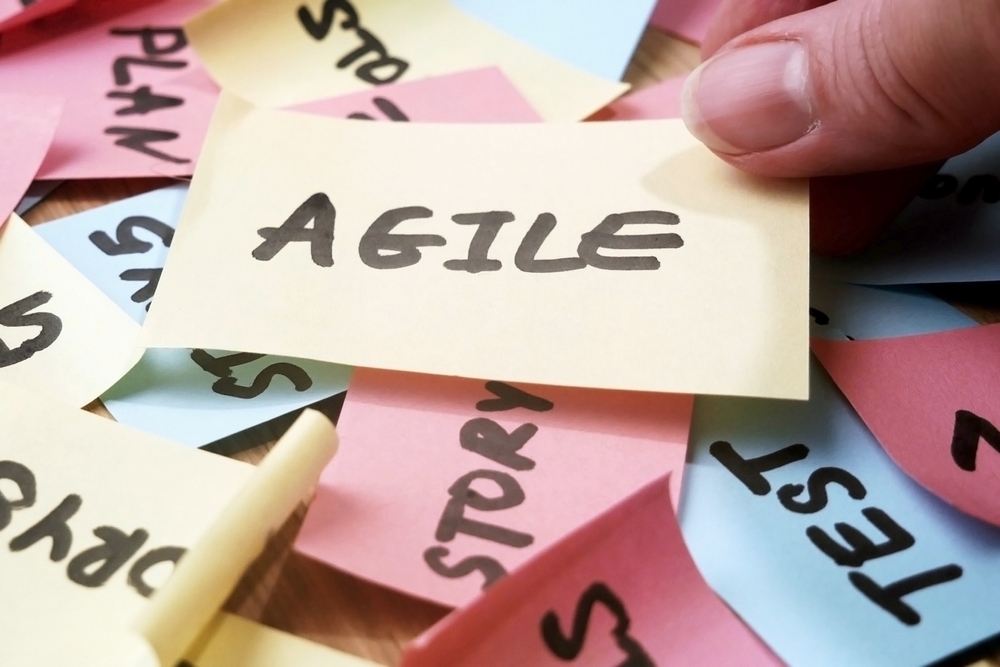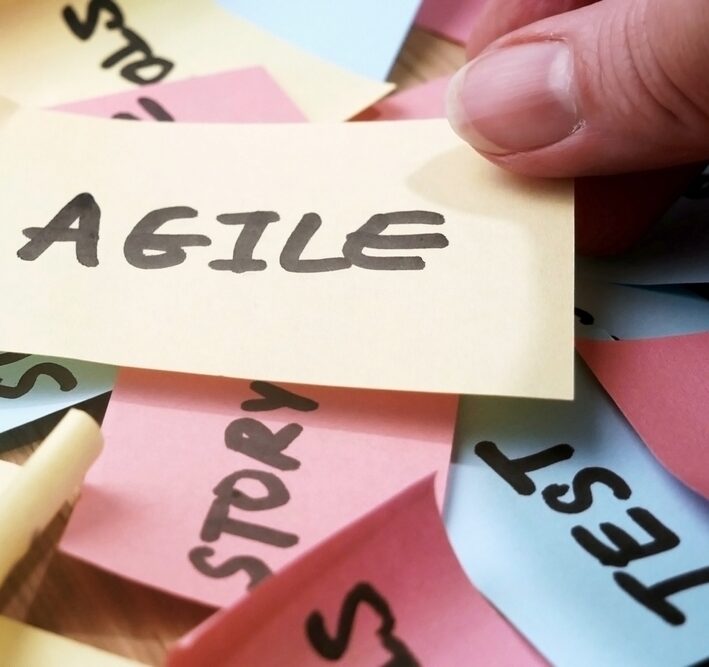

Unlocking Success with an Agile Mindset
10/04/2024Agile is a scalable framework (or methodology) where solutions evolve through collaboration between self-organizing, cross-functional teams. Unlike traditional waterfall methods of project delivery, agile teams do not have a set start date or end date. Rather, the mindset allows for smaller, nimble teams to remain intact indefinitely where they promote a high degree of collaboration both within and across teams to continuously generate value.
When applied to product management, an Agile mindset inspires innovation and gives companies a productive edge. By building teams that invest in their work and treat tasks as enabling product value vs projects to be completed, your company can maximize its existing resources and deliver more value.
If you’re curious about Agile and how it could improve efficiency and morale at your company, the experts at PCG are here to help. We’ve put together this short guide to explain what Agile is, how it benefits companies, and why Agile has a distinct advantage over a more traditional waterfall method of working. We’ll also explain how PCG’s hands-on coaching style can ensure your Agile transformation is smooth, impactful, and sustainable.
Agile Framework (or Methodology) Explained
At its core, Agile prioritizes collaboration over heavy documentation, customer satisfaction over volume of code delivered, and the ability to pivot quickly when needed. Rather than working in long, rigid phases (as in traditional project management), Agile teams work in short bursts, known as “sprints,” to continuously deliver incremental improvements to a product. Operating in these short delivery and planning windows allows for interruption by design and adaptation to new insights or changing business priorities.
An Agile system of incremental delivery and releases facilitates the realization of actual business value much earlier than in traditional project delivery (waiting until the end of the project for a “big bang” release). This ensures that customers see results quickly and incorporates feedback loops early in the process. These early insights on both business value and customer usability help mitigate potential risks and rework that would otherwise go unnoticed until much further down the development journey.
12 Principles in the Agile Manifesto
Within the Agile Manifesto there a 12 guiding principles:
- Our highest priority is to satisfy the customer through early and continuous delivery of valuable software.
- Welcome changing requirements, even late in development. Agile processes harness change for the customer’s competitive advantage.
- Deliver working software frequently, from a couple of weeks to a couple of months, with a preference to the shorter timescale.
- Business people and developers must work together daily throughout the project.
- Build projects around motivated individuals. Give them the environment and support they need, and trust them to get the job done.
- The most efficient and effective method of conveying information to and within a development team is face-to-face conversation.
- Working software is the primary measure of progress.
- Agile processes promote sustainable development. The sponsors, developers, and users should be able to maintain a constant pace indefinitely.
- Continuous attention to technical excellence and good design enhances agility.
- Simplicity—the art of maximizing the amount of work not done—is essential.
- The best architectures, requirements, and designs emerge from self-organizing teams.
At regular intervals, the team reflects on how to become more effective, then tunes and adjusts its behavior accordingly.
4 Benefits of Adopting an Agile Approach
When companies shift to an Agile mindset, they often experience a number of key benefits, including:
1. Improved Productivity, Flexibility, and Adaptability
While traditional project delivery entails the completion of a phase before the next begins (planning, design, development, testing,…), operating agile generally means having multiple functions happening in unison. In addition, a common tenant of smaller agile teams is to cross-train individuals to wear multiple “hats” (e.g., someone who has traditionally operated as a BA also plays the role of a QA). Thus, improving the productivity of your talent by 20-50%.
2. Faster Time to Market
Agile efforts generally incorporate a Minimum Viable Product (MVP) approach to releases. This involves deployment of a core set of functionality (without all the bells and whistles) to more immediately realize business benefits while also gaging customer response. This sets a foundation to build upon with incremental improvements and adoption of insights. See your market time improve 30% or more.
3. Higher Quality
Instead of only implementing a testing phase near the end of a project, quality assurance and testing are treated as a continuous activity. Here, Agile teams can catch and resolve issues earlier in the development process. This “building in” quality leads to fewer bugs and reduced risk of high severity issues upon delivery. See 25-75% improvements in quality.
4. Employee Satisfaction and Engagement
With a servant leadership mindset, the culmination of the above tends to foster a culture of accountability, collaboration, and ownership in the success of the end product. Employees tend to regard the relationships established while working in smaller, high-functioning, and self-organizing teams where their efforts get noticed. At the end of the day, this increased collaboration and sense of teamwork leads to employees who are 10-50% happier and more engaged.
Could My Company Benefit from Adopting an Agile Mindset?
Integrating the right Agile framework into your company’s processes can catalyze big changes. If you are looking for increased innovation and optimization so that your teams “get things done,” Agile is your blueprint for transformation.
Your company may be a good candidate for Agile if you:
- Work in software delivery
- Want to shift from a “project” mindset to a “product” mindset
- Struggle to keep up with rapidly changing markets
- Experience rapid growth
- Have complex cross-functional teams
- Want to decrease your time-to-market
- Navigate project bottlenecks regularly
- Hope to foster a culture of continuous improvement
While Agile is highly effective in a range of industries and business models, it’s essential to assess your organization’s needs, structure, and challenges to determine if Agile coaching is the right fit.
How PCG Transforms Companies
At our consulting firm, we don’t just teach Agile from a theoretical standpoint—we live it. Our team of seasoned Agile coaches has worked with some of the largest Fortune 1000 companies as well as ambitious mid-market businesses to implement Agile principles in real-world scenarios.
Custom Solutions Built on Experience
We don’t believe in a one-size-fits-all Agile solution. PCG’s team works side-by-side with your employees so we can get to know your company and understand your unique challenges. Our approach then tailors Agile frameworks to fit your needs and goals.
A Hands-On, “In the Trenches” Approach
Our coaches don’t just deliver training and leave. We embed ourselves to ensure Agile is understood, adopted, and implemented successfully. We guide Agile teams through their first sprints, help troubleshoot challenges, and ensure that Agile becomes a sustainable, long-term part of your company’s culture.
Meet You Where You Are
We prioritize measurable outcomes based on where you are. Whether your goal is to accelerate time-to-market, improve team collaboration, or increase customer satisfaction, we work relentlessly to ensure your Agile transformation delivers the results you want to see.
Foster a Positive Culture
We improve the way your employees work so that they enjoy the tasks ahead of them. Agile transforms company culture to be more positive, supportive, and inclusive. It empowers teams and individuals to take ownership of their work and feel proud of their accomplishments.

Make an Agile Leap Forward
Adopting an Agile mindset can be a game-changer for businesses looking to enhance efficiency, adaptability, and customer satisfaction. The iterative, flexible nature of Agile allows you to stay ahead in a rapidly changing environment. Whether you’re looking to implement Agile for the first time or take your deployment from good to great, PCG’s hands-on coaching can help your business unlock its full potential.
Contact us today to learn more about how our tailored, immersive coaching programs can drive greater success in your organization.
